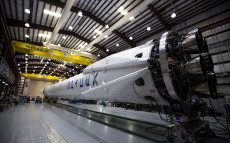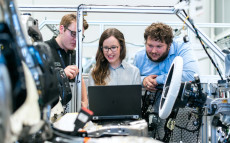- pathfindersAI
- Job Profile
Robotics Engineers
Summary
Robotics Engineer Job Description
What They Do
Robotics Engineers are trailblazers in the integration of engineering, computer science, and complex machinery to create autonomous systems that can perform a range of tasks with minimal human intervention. Venturing into areas like manufacturing, healthcare, military, and space exploration, these professionals are at the forefront of innovation and technology. They design, test, and improve robotic systems, ensuring they are both efficient and functional, while meeting the specific needs of various industries. The role is a perfect amalgamation of creativity and technical expertise, requiring a deep understanding of both theoretical concepts and practical implementations.
Job Responsibilities
Robotics Engineers have multifaceted roles that encompass a wide array of responsibilities. Primarily, they are responsible for designing robotic systems and machinery, which involves creating detailed blueprints and schematics. They work collaboratively with other engineers and professionals to develop prototypes and carry out extensive testing to refine their designs. Troubleshooting and debugging are critical aspects of their job, requiring meticulous attention to detail. Additionally, they often focus on programming these machines to perform specified tasks, necessitating expertise in coding languages such as C++ and Python. Conducting feasibility studies on project proposals and ensuring that all robotic systems comply with safety and regulatory standards are also vital elements of their duties.
Essential Skills
The multifaceted nature of a Robotics Engineer's job demands a diverse skill set. Analytical skills are paramount, as these professionals must evaluate intricate systems and resolve complex problems. Advanced mathematics, particularly in areas like calculus and linear algebra, form the foundation of most robotic system designs. Proficiency in computer-aided design (CAD) software is essential for creating detailed and precise schematics. Additionally, strong programming skills in languages such as Python, C++, and ROS are indispensable for coding robotic behaviors. Creativity and innovative thinking facilitate the design of cutting-edge solutions, while collaboration and communication skills ensure effective teamwork and project success. A solid understanding of mechanical, electronic, and software systems integration is also crucial.
Educational Pathways
Pursuing a career as a Robotics Engineer typically begins with a bachelor's degree in robotics engineering, mechanical engineering, electrical engineering, or computer science. Coursework often includes subjects such as digital systems, control systems, microprocessors, machine learning, and artificial intelligence. Some positions, especially those in research and academia, may require a master's degree or Ph.D. Additionally, internships and co-op programs provide hands-on experience, which is highly valued by employers. Certifications from professional organizations, such as the Association for Advancing Automation (A3), can also enhance job prospects. Continuous learning through specialized workshops and online courses is imperative to keep up with technological advancements and industry trends.
Career Prospects
The career outlook for Robotics Engineers is exceedingly promising due to the rapid advancement of technology and increasing reliance on automation across various industries. According to the Bureau of Labor Statistics, employment in this field is expected to grow much faster than the average for all occupations. Robotics Engineers can find opportunities in diverse sectors such as manufacturing, healthcare, automotive, aerospace, and entertainment. Positions range from research and development roles to application-focused jobs, such as process engineering and system integration. Additionally, experienced Robotics Engineers often ascend to managerial or executive positions, where they oversee engineering teams and projects. The emergence of new industries, like autonomous vehicles and smart manufacturing, further broadens the horizon for aspiring robotics professionals.
Conclusion
In summary, the role of a Robotics Engineer is both challenging and rewarding, offering a blend of technical prowess and creative problem-solving. Their work is instrumental in driving innovation, enhancing productivity, and improving the quality of life. With a strong educational foundation, a versatile skill set, and an eye for detail, one can excel in this dynamic and evolving field. The demand for Robotics Engineers is on an upward trajectory, making it a viable and exciting career option with numerous pathways for growth and specialization.
Video
Compensation
| State | Median Salary | Median Hourly | Positions |
|---|---|---|---|
| SD | * | * | 100 |
| AL | 136,990 | 65.86 | 3,480 |
| AK | 124,790 | 60.00 | 310 |
| AZ | 104,660 | 50.32 | 2,560 |
| AR | 73,160 | 35.18 | 500 |
| CA | 128,620 | 61.84 | 31,490 |
| CO | 124,440 | 59.83 | 2,590 |
| CT | 126,400 | 60.77 | 2,120 |
| DE | 131,980 | 63.45 | 210 |
| DC | 158,830 | 76.36 | 2,640 |
| FL | 100,140 | 48.14 | 8,080 |
| GA | 113,230 | 54.44 | 3,750 |
| HI | 119,770 | 57.58 | 720 |
| ID | * | * | 1,050 |
| IL | 107,490 | 51.68 | 2,740 |
| IN | 100,720 | 48.42 | 1,920 |
| IA | 87,940 | 42.28 | 420 |
| KS | 65,570 | 31.52 | 760 |
| KY | 84,340 | 40.55 | 890 |
| LA | 92,600 | 44.52 | 6,950 |
| ME | 102,480 | 49.27 | 650 |
| MD | 131,440 | 63.19 | 6,240 |
| MA | 120,460 | 57.91 | 3,180 |
| MI | 97,530 | 46.89 | 4,720 |
| MN | 108,360 | 52.10 | 1,900 |
| MS | 107,810 | 51.83 | 520 |
| MO | 95,980 | 46.15 | 1,610 |
| MT | 79,480 | 38.21 | 400 |
| NE | 75,560 | 36.33 | 460 |
| NV | 84,580 | 40.66 | 700 |
| NH | 108,550 | 52.19 | 590 |
| NJ | 125,270 | 60.23 | 3,670 |
| NM | 134,650 | 64.74 | 2,180 |
| NY | 109,170 | 52.49 | 5,570 |
| NC | 105,860 | 50.89 | 2,890 |
| ND | 83,990 | 40.38 | 260 |
| OH | 106,390 | 51.15 | 6,530 |
| OK | 101,760 | 48.92 | 1,130 |
| OR | 125,110 | 60.15 | 2,690 |
| PA | 100,280 | 48.21 | 4,850 |
| RI | 129,160 | 62.10 | 480 |
| SC | 106,540 | 51.22 | 1,640 |
| TN | 86,070 | 41.38 | 4,350 |
| TX | 108,380 | 52.10 | 8,200 |
| UT | 102,220 | 49.15 | 1,920 |
| VT | 100,490 | 48.31 | 550 |
| VA | 136,490 | 65.62 | 5,670 |
| WA | 113,190 | 54.42 | 2,740 |
| WV | 127,880 | 61.48 | 430 |
| WI | 101,040 | 48.58 | 770 |
| WY | 130,490 | 62.74 | 210 |
Similar Occupations
In this area you will find other occupations that are close to the one you were viewing in tasks, knowledge and work environment. If the primary job profile you are viewing isn't quite to your liking, take a look around and see what else is available.
Basic and Premium Accounts have more alternative occupations available than the Free account.

Aerospace Engineers - 17-2011.00
Aerospace Engineers design, develop, and test aircraft, spacecraft, and related systems and equipment to ensure they meet safety, performance, and regulatory standards. They work on a range of areas including structural design, navigation systems, propulsion, and aerodynamics to advance aviation and space exploration technology.
-
$130,720/yr
Median Pay -
66,660
Number of Jobs

Automotive Engineers - 17-2141.02
Automotive Engineers design, develop, and improve vehicles and their subsystems, ensuring they meet performance, safety, and efficiency standards. They work on tasks ranging from creating prototypes to conducting rigorous testing and collaborating with multidisciplinary teams to bring innovative automotive solutions to market.
-
$99,510/yr
Median Pay -
281,290
Number of Jobs